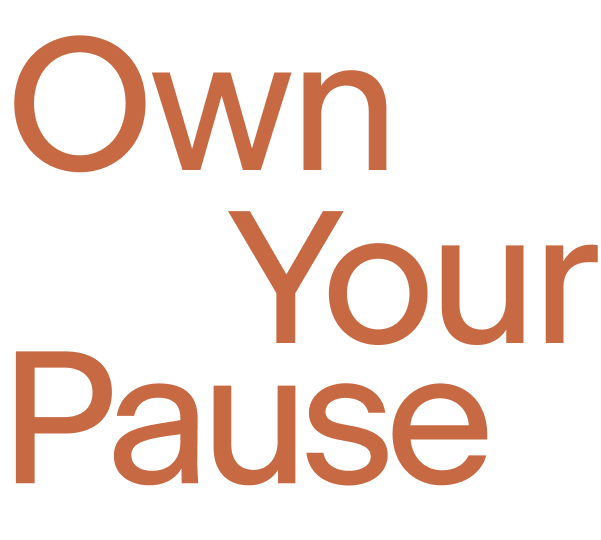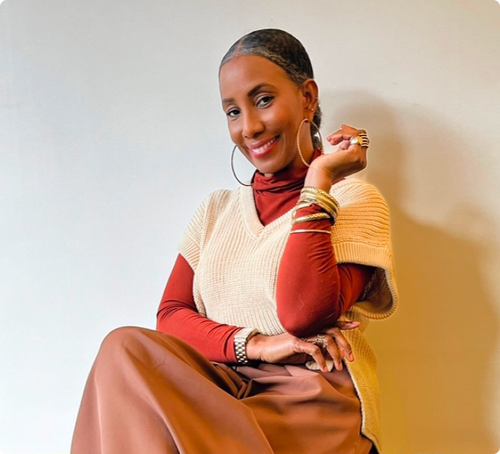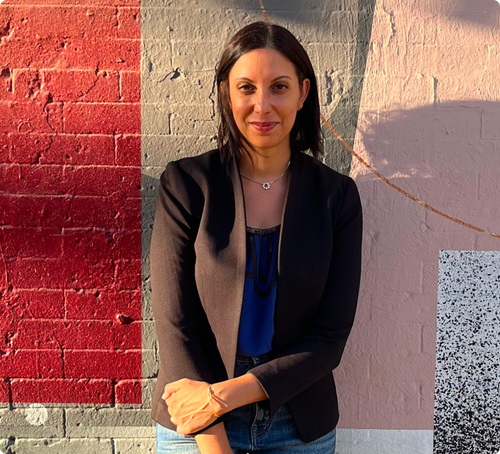Stories of The Pause
Understanding Your Pause
What is menopause?
Menopause is a medical term defined as the day–that’s right, one single day–at which a woman (or biologically female person) has gone twelve consecutive months without a period. This life transition can last much longer than many expect and has several phases.
Premenopause: the time from puberty until menopause.
Perimenopause: when symptoms of hormonal change start to manifest, before the official day of menopause. Perimenopause typically occurs from 45-55. However, it can start much earlier and women are sometimes not even aware of when it begins. For more information defining the onset of perimenopause, explore “why does menopause happen” below.
Menopause: The day marking 12 consecutive months since your last period.
Postmenopause: Your entire life after menopause.

Why does menopause happen?
Hormones are our body’s chemical messengers. They’re responsible for sending signals through the bloodstream to regulate our tissues, organs, and body functions, both emotional and physiological. Learn more.
You might describe the menopause transition experience as a "hormonal rollercoaster." During menopause, our hormone levels are in flux: estrogen, progesterone, and testosterone levels decline, and levels of follicle-stimulating hormones (FSH) and luteinizing hormones (LH) rise.
Did you know?
You have 400 estrogen receptors in your body which are essential for performing over 300 bodily functions! Because estrogen is in decline during menopause, tremendous physiological and emotional changes can occur.

When does menopause happen?
The average age of ‘natural’ menopause is 51 in the U.S., with perimenopause typically occurring in the 45-55 age range. However, timing of the pause is different for everyone and can start in a variety of ways, depending on medical and environmental factors. Whenever your pause happens for you, remember that there’s absolutely nothing to be ashamed of.
- ‘Natural’: typical transition at the average age of 51.
- Premature: menopause before age 40. The ovaries stop maturing eggs due to lower levels of estrogen caused by chromosomal abnormalities, some cancer treatments, autoimmune diseases, or infectious diseases.
- Early: menopause occurs in the 40-45 year range due to genetic factors, autoimmune and thyroid diseases, viral illnesses, chronic fatigue syndrome, smoking, and certain medications or treatments.
- Surgical: when menopause happens suddenly due to the removal of one or more ovaries and/or hysterectomy performed to address cancers of the reproductive system, genetic risk, fibroids, heavy menstrual bleeding, endometriosis, as a gender-affirming procedure, or due to other reasons or health conditions.
- Medical: when cancer therapies (radiation or chemotherapy) are directed at the ovaries and cause a person's ovaries to stop functioning before menopause would normally occur, causing the onset of medical menopause.
Primary Ovarian Insufficiency (POI): ovulation dysfunction and/or hypoestrogenism can cause menopause onset. Doctors do not understand the exact reason for POI, but it is likely due to genetic abnormalities, exposure to toxins, and/or autoimmune disorders.

How long does menopause last?
On average, people will experience menopause symptoms for 7 years across perimenopause, menopause, and postmenopause. Some women may not present symptoms - their period may just fluctuate and then cease. Others have symptoms that last for 15 years!

Manage Your Pause
Lifestyle Changes
Nutrition
While each person has unique dietary needs, a balanced diet is critical during menopause. Try to limit how often you consume foods that trigger your symptoms. Often, trigger foods include processed foods, sugary beverages and desserts, caffeine, alcohol, spicy food, and high-sodium foods. A diet consisting of fresh, organic foods like whole grains, healthy fats (avocado, olive oil), high fiber, calcium-rich foods, colorful fruits and vegetables, and legumes is generally recommended. Hydration is also incredibly important! Be sure to drink plenty of water. See below for the benefits of consuming seaweed as part of your daily nutrition.
Exercise
Movement is critical to supporting one’s long-term health. During menopause, hormonal changes can decrease muscle mass, cause weight gain and redistribution, bone weakening, and increased cardiovascular risk. In addition to regular cardio exercise for heart health, strength training (lifting heavy weights and resistance exercise) is an excellent way to build muscle mass and bone strength. Movement that emphasizes balance and flexibility can help you to maintain (and expand!) your range of motion, reducing your risk of falls and relieving muscle tension, soreness, and stiffness.
Sleep
Many women have trouble sleeping during menopause, which can intensify overall stress and exacerbate other symptoms. You can increase the likelihood of restful sleep by maintaining a consistent sleep schedule and relaxation routine, minimizing blue light from devices for an hour before bedtime, and having a dark, quiet, and cool room.
Alternative Therapies
There are many complementary and alternative therapies that women find helpful during menopause, including hypnotherapy, cognitive behavior therapy, supplements, acupuncture, yoga, massage therapy, functional medicine, herbs, time outdoors in nature, and more.
Mindfulness, Meditation, & Self Care
The menopausal transition can be deeply stressful. It’s important to take care of your mental wellbeing during this time. Many people find practices and rituals such as mindfulness, meditation, and journaling helpful in developing a deeper sense of self and a positive outlook during this time. While these practices aren’t for everyone, it may be worthwhile to give them a try!
Medical Interventions
Finding the right doctor
When working with a trusted doctor or medical professional to treat symptoms, It’s critical to work with someone with specific expertise in menopause, who knows your health history, validates your experiences, and can recommend strategies that are aligned with your personal, cultural, and spiritual preferences. The medical system is not designed to provide this critical care, thus it can be challenging to find a trusted medical professional. 85% of internal medicine residents said they don’t feel prepared to talk about and treat menopause. A great resource for menopause experts is the Menopause Society (www.menopause.org).
When working with a medical professional, always remember that you are the expert on your own body. Our symptom tracker can be a useful tool for having meaningful conversations with your doctor and practicing self-advocacy. It's important that your concerns are validated and addressed by your healthcare providers. If you feel dismissed or invalidated by your healthcare provider, you may want to find a different provider.
Hormone Replacement Therapy
Menopause Hormone Therapy (MHT) is considered the “gold standard” for care by most of the menopause institutions and experts for mitigating symptoms and improving your long-term health. Many forms of MHT can be utilized, but they focus on providing the hormones that are lost during menopause, such as estrogen and sometimes progesterone. Likewise, there are a variety of other prescription options available to help with menopause, should you not be a candidate or not wish to pursue MHT. Consult with a trusted healthcare professional to learn more.
Benefits of Seaweed
Gut health
The imbalance of gut bacteria due to estrogen loss in menopause can lead to various symptoms such as mood swings, loss of libido, weight fluctuation, and hot flashes. Regular consumption of seaweed promotes estrogen metabolism, providing prebiotic fiber to nourish the gut and maintain a balanced microbiome.
Thyroid health
The thyroid gland plays a crucial role in energy regulation, brain functioning, metabolism, and hormone management. Iodine is essential for proper thyroid function, and seaweed, being a rich source of iodine, helps prevent an underactive thyroid. This, in turn, reduces fatigue, weight gain, and depression, especially as the body becomes less efficient at absorbing iodine with age. Consuming Rootless daily provides your full iodine requirements to help promote proper thyroid function and decrease the intensity and severity of hot flashes.
Bone health
Seaweed contains essential minerals like calcium, magnesium, and iron, vital for maintaining healthy bones and reducing the risk of osteoporosis. These are important for keeping bones healthy, lowering the chance of osteoporosis, and supporting well-being during the menopause transition.
Inflammation & immunity
Hormonal changes during perimenopause and menopause can induce inflammation and oxidative stress. Seaweed, with its fatty acids, polyphenols, and antioxidants, helps protect the body from these effects, reduces inflammation, and strengthens immunity.
Skin health
Menopausal hormonal fluctuations and depletion often lead to hormonal acne and dryness. Seaweed, rich in vitamins A, C, and E, proves vital for skin health and immunity, helping address these skin issues.








